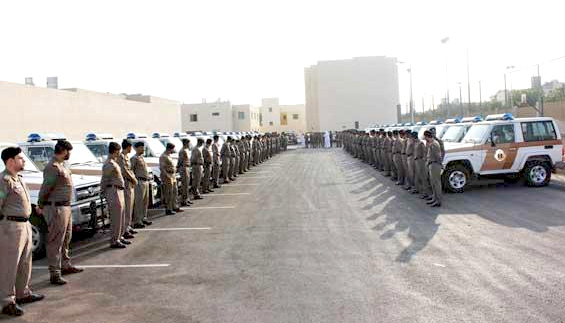Riyadh, Aug 25: The Ministry of Labor and the Riyadh police are setting up a joint operations team to nab labor law violators in the Riyadh region as new raids on Sunday targeted recruitment offices in Riyadh that were dealing with undocumented workers.
 The decision follows a meeting held in Riyadh between Abdullah Al-Olayan, director-general of the Labor Ministry’s branch office, and Capt. Sulaiman Al-Sudais, deputy director of the Riyadh police. Both parties agreed during the talks to form a joint strategy to identify illegal expat strongholds in Riyadh and chalk out plans for future operations. Labor inspectors across the Kingdom are linked with the operation center with special devices in order to record violations against firms more efficiently.
The decision follows a meeting held in Riyadh between Abdullah Al-Olayan, director-general of the Labor Ministry’s branch office, and Capt. Sulaiman Al-Sudais, deputy director of the Riyadh police. Both parties agreed during the talks to form a joint strategy to identify illegal expat strongholds in Riyadh and chalk out plans for future operations. Labor inspectors across the Kingdom are linked with the operation center with special devices in order to record violations against firms more efficiently.
“The new automatic system will be implemented by the middle of next month to make inspections more effective,” the minister said.
The Labor Ministry conducted raids on Sunday on recruitment and service offices in Riyadh and arrested 20 maids who had run away from their employers. The ministry also warned recruitment offices against operating without a valid license.
Dawood Al-Subhi, supervisor of inspection teams, said the labor law emphasizes the Kingdom’s right to implement its regulations to safeguard its interests, while protecting the rights of employers and workers.
On Thursday, Riyadh Gov. Prince Turki bin Abdullah led a police team to arrest a large number of illegal expatriates living in the south of the capital.
Those who have been residing in the Manfouha district, south of Batha, without legal documents were rounded up.
The arrested people will be investigated and will be subject to fines and deportation depending on the nature of the cases. The Riyadh police arrested 307 illegal residents, including 13 wanted men, in a pre-dawn operation conducted under the direct supervision of Maj. Gen. Saud Al-Hilal last month.





Comments
Add new comment